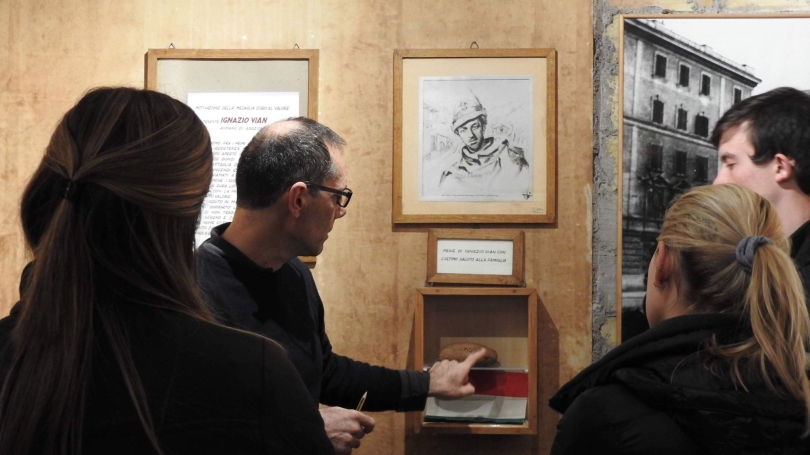
- Undergraduate
- Exchange Program
- Research
- Equity
- News & Events
- People
- Contact us
Back to Top Nav
Back to Top Nav
Back to Top Nav
A new program funds the introduction of creative design methods into courses in the humanities, social sciences, and beyond.
The Dartmouth Center for the Advancement of Learning (DCAL) and the Design Initiative at Dartmouth (DIAD) are partnering to offer training and course development grant funding to faculty wishing to infuse interdisciplinary design methods into their courses. In its inaugural cohort, the program is engaging six faculty teaching courses in winter and spring terms 2022 to bring new design-based experiential learning opportunities to their students.
ITAL 10 (Intro to Italian Literature) – In this course offered during the Language Study Abroad program in Rome this winter, Prof. Graziela Parati's students will learn to see and understand the city in new ways by designing tourist brochures that describe a diverse and multicultural Rome. The students will work with Somali writer Igiaba Scego and hip-hop artist Amir Issaa to develop their designs. With Scego and Issaa as guides, students will explore Rome, collecting traditional tourist materials that do not match the more diverse identity of Rome that Scego and Issaa portray in their art. Through observation and graphic design, the students will uncover hidden histories and highlight important narratives of diverse voices in the city.
SOCY 91 (The Sociological Imagination) – In Profs. Kim Rogers and Jason Houle's capstone course taught this winter term, students will conduct community-engaged research to apply and reflect on the concepts, knowledge, and skills they have developed in pursuit of their sociology major. Beginning with a social problem of their own choosing, students will pitch research projects designed to address that social problem in the local community, and with local stakeholders as their primary audience. Working in groups, students will undergo a design process to develop data-driven solutions, gather input and feedback from their instructors and classmates, then prepare and present their solutions to their community stakeholders. Through the experience, students will engage in practical social science research and contribute to addressing the real-world problems that exist in their communities.
ANTH 12.26 / GEOG 68 (Environmental Justice / Energy Justice) – In these companion courses taught during winter and spring terms, Profs. Maron Greenleaf and Sarah Kelly will engage students in the newly developed Energy Justice Clinic, an experiential service learning opportunity. Through the Clinic, students will use design methodologies to empathize with community partners involved in environmental and energy decision-making to support more sustainable local futures. Partners include the Mapuche-Williche Indigenous communities in Chile, who are engaged in a water-energy conflict, and the town of Hanover and other New Hampshire communities, who are making the shift to renewable energy sources. Students will conduct surveys and interviews, analyze documents, make observations, and collect other relevant data to inform their designs of final products, to be presented to their community partners.
SPAN 06 (Spanish Language Study Abroad) – In Prof. Roberto Rey Agudo's Language Study Abroad course taking place in Barcelona in winter term, students will develop artifacts that reflect their explorations of the city in relation to the texts and topics discussed in class. They will use the design process to engage with the questions, "What does it look like to live in Barcelona?" and "What does a language learner need to understand life in Barcelona?" Following their own interests and areas of expertise, students will analyze their experiences in Barcelona in the context of the academic knowledge they have gained, the tools of intercultural competence they have practiced, and the skills of empathy toward others' experiences to create a library of materials for future language learners.
"It's inspiring and exciting to see how faculty from across different disciplines at Dartmouth are using the tools and mindsets of design to enhance their teaching and bring their subjects to life for their students." – Eugene Korsunskiy, Co-Director of DIAD
In addition to grant funding for materials and other project costs, DCAL and DIAD are providing ongoing coaching to the faculty to support the successful implementation of these design projects in their courses.
The next call for proposals for design course development grants will open in spring term for courses to take place in summer '22 and fall '22. Applications will be due on Monday April 25, 2022. Dartmouth faculty interested in learning more about infusing design into their courses are encouraged to attend one of a series of workshops that will be offered in the winter and spring terms. More information about the workshops and the grant application will be published here as it becomes available.
About DCAL
The Dartmouth Center for the Advancement of Learning (DCAL) improves teaching and learning by providing resources, removing barriers, promoting evidence-based practices, and building partnerships to cultivate a culture that values and rewards teaching for all members of Dartmouth's scholar-educator community. All Dartmouth faculty are encouraged to take advantage of DCAL resources, including this and other available grant funding opportunities.
About DIAD
The Design Initiative at Dartmouth (DIAD) nourishes cross-campus collaborations at the intersections of design thinking, engineering, and the liberal arts. DIAD is creating new design-based curricular, co-curricular, and scholarship opportunities for Dartmouth students, faculty, and staff, fostering a joy of learning and making grounded in addressing complex social issues. More information and links to apply for diverse DIAD funding opportunities can be found here. All Dartmouth students and faculty are encouraged to apply.